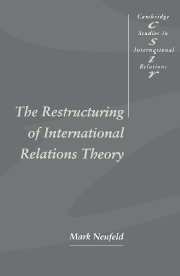Book contents
- Frontmatter
- Contents
- Acknowledgments
- Introduction
- 1 International Relations theory and the Aristotelian project
- 2 Defining positivism
- 3 Reflexivity and International Relations theory
- 4 Human consciousness and International Relations theory
- 5 International Relations theory and social criticism
- 6 Conclusion
- Notes
- Bibliography
- Index
- CAMBRIDGE STUDIES IN INTERNATIONAL RELATIONS
3 - Reflexivity and International Relations theory
Published online by Cambridge University Press: 15 December 2009
- Frontmatter
- Contents
- Acknowledgments
- Introduction
- 1 International Relations theory and the Aristotelian project
- 2 Defining positivism
- 3 Reflexivity and International Relations theory
- 4 Human consciousness and International Relations theory
- 5 International Relations theory and social criticism
- 6 Conclusion
- Notes
- Bibliography
- Index
- CAMBRIDGE STUDIES IN INTERNATIONAL RELATIONS
Summary
The ‘personal equation’ of the political scientist both limits and directs his scholarly pursuits. The truth which a mind thus socially conditioned is able to grasp is likewise socially conditioned. The perspective of the observer determines what can be known and how it is to be understood.
Hans J. Morgenthau‘That we disavow reflection is positivism.’
Jürgen HabermasIntroduction
We are now in a position to begin to address the central contention of this study. Specifically, at several points in this book, the following two arguments have been advanced. First, it has been suggested that the absence of the ‘critical’ elements which constitute emancipatory theory from the discipline of International Relations can be explained in terms of the predominance of positivism in International Relations theory. Secondly, it has been suggested that the predominance of positivism in International Relations theory is no longer unchallenged; that the prospects for incorporating the elements which distinguish emancipatory theory are improving. In sum, it is being suggested that there are signs that International Relations theory is in the process of being ‘restructured’ in a fundamental, ‘critical’ fashion, and that as a consequence, the potential for the discipline of International Relations to make a meaningful contribution in terms of the contemporary requirements of the Aristotelian project — a contribution to human emancipation — are better now than they have been for some time.
- Type
- Chapter
- Information
- The Restructuring of International Relations Theory , pp. 39 - 69Publisher: Cambridge University PressPrint publication year: 1995



